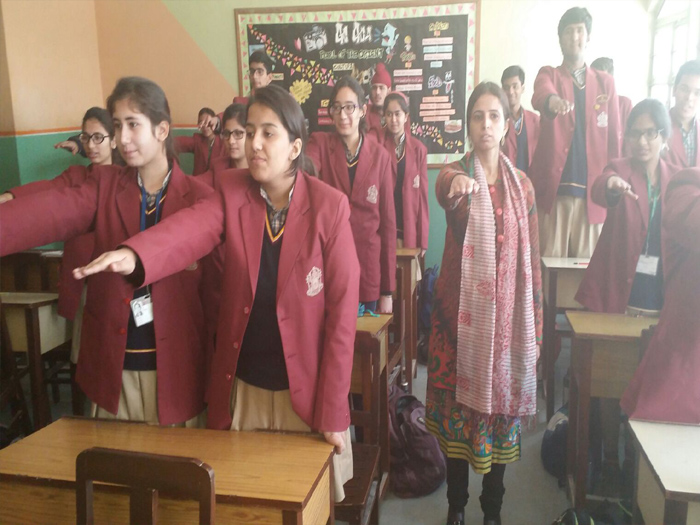School observes National Voters Day
National Voters Day was observed on 25 January, 2016. At School too, we marked this occasion with a small ceremony in which the students of classes XI and XII took a pledge to exercise their voting rights in a responsible manner.
An important reason to highlight this occasion is to entreat the youth to actively embrace this responsibility in every earnest. With this in mind, our political science teacher Ms. Sheerja Kapur took the opportunity to specially brief us about the importance of voting and the need to exercise the right carefully. People often choose not to vote because they feel an individual vote does not make an impact. But this is untrue. Each vote wields weight. If one is dissatisfied with the government, this is the chance to replace it with another, more competent option. If one doesnt vote, it may only result in the continuation of a stagnating, or worse, corrupt government. By the right to vote, individuals exercise influence in societal and political matters and decisions. But it is sad that many people in India are ignorant about their voting rights and why is it critical.
[gallery link="file"]
India is the largest democracy in the world and it is called such because it has the largest number of people who can vote. But India has to dribble past, as it were, multiple goalposts to become an most effective democracy in the ultimate sense.
The first general elections of India were held in 1951-52. Millions of people, who had until then been ruled by oppressive policies, now became the rightful selectors of government. But it wasn't an easy task. Alas many of those who were eligible to vote by age, were entirely ignorant and inexperienced.
The minimum age to be eligible to vote is 21. Around 176 million Indians met the criterion at the time. But the big issue was that around 85% of these individuals were unlettered and were unable to even recognise, leave alone read or identify the names of contesting candidates on the ballot sheet! The method of pictorial representation was then tried to assist the inadequacy.
Also, India was in the grip of social backwardness at the time. Many Indian women preferred to identify themselves as their children's mothers or their husbands' wives! An independent identity was often elusive for Indian women of the period. When the electoral list with the incomplete description of women voters was reviewed, the names of almost 2.8 million voters had to be struck off !
Since then India has come a long way. A larger proportion of the adult masses are educated and aware and this is enabling changes in the way elections are held. A recent example is the 2014 general election where there was an increase of 100 million voters since the previous general election of 2009, making it the largest ever election in the world. By observing National Voters' Day, the government aims to persist with drawing more of the non urban population into effective citizens of a large democracy.
The students of classes XI and XII, along with their teachers, took the following pledge on Voters Day:
We,nthe citizens of India, having abiding faith in democracy, hereby pledge to uphold the democratic traditions of our country and the dignity of free, fair and peaceful elections, and to vote in every election fearlessly and without being influenced by considerations of religions, race, caste, community, language or any inducement.
Jai Hind.
Surabhi Sanghi (XIC).













